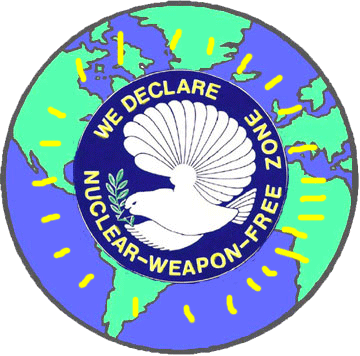We’re Off! to Ban Nuclear Weapons

It’s game on for round two of the nuclear ban negotiations! Delegations from governments, civil society, and international organisations are rallying in New York City at the United Nations to start deliberating over the President’s draft treaty text—and to start crafting one of the most ambitious piece of international law ever attempted. People from around the world are also preparing to rally outside of the UN building, and in their home cities, in two days in support of these talks. The Women’s March to Ban the Bomb will see actions in Australia, Canada, Cameroon, Denmark, Germany, Italy, Japan, New Zealand, the Philippines, the United Kingdom, and the United States! The world is watching: it’s time to ban the bomb.
Inside the conference room this week and next, states and others will review the draft treaty text released by Ambassador Elayne Whyte Gómez, the President of the conference, on 22 May. This text is a good basis for negotiations, which we hope will be constructive and ambitious over the next few weeks.
From Reaching Critical Will’s perspective, the text could be improved with the addition of core prohibitions on planning and preparations to use nuclear weapons, and on transit of nuclear weapons. These prohibitions would cover some of the most vital activities necessary to sustain nuclear “deterrence” practices. In October, the US government very clearly spelled out how prohibiting these activities would affect its ability to move its weapons around the world or prepare to use them. Prohibiting “assistance” in the treaty is key, but prohibiting these two things explicitly may be one of the few ways in which non-nuclear-armed states can most effectively impact operational practice related to the unfettered global exercise of “extended nuclear deterrence”.
An explicit prohibition on financing would also help provide clarity and guidance towards treaty implementation, which could include national prohibitions on financial or material support to public and private enterprises involved in any of the activities prohibited by the treaty. This could reduce the incentives for private companies to accept any work related to nuclear weapons. In this regard, this treaty could raise the political and economic costs of maintaining nuclear weapons. It could also help remove the influence of private interests from any decision-making processes related to nuclear weapons production and disarmament. It could also increase the societal stigmatisation of nuclear weapons, including through public divestment programmes.
In articles 2–5, the draft treaty grapples with the various ways that nuclear-armed states could work with states parties to eliminate their nuclear weapons or pursue other “effective measures” for nuclear disarmament, and what kinds of safeguards, verification, and declaratory arrangements would be necessary for this. Consideration of these articles should be taken together. Overall it will be necessary to clearly establish that the treaty is open to all states on an equal basis and that there is an obligation to destroy stockpiles, as this treaty is intended to lead to the elimination of nuclear weapons.
Adjustments will also be need to strengthen the provisions on victim assistance, environmental remediation, and international cooperation and assistance—though the text as written is a good starting point for this work. Issues related to meeting of states parties, institutional support, withdrawal, and the ban treaty’s relationship with other instruments will also need to be solved over the next three weeks, though a lot of common ground was expressed in March and is reflected in the draft.
To help the overall framing of this treaty, the preamble should improve its language on gender—recognising a broader range of impacts than just ionizing radiation on maternal health—and adding a recognition of the disproportionate impact of nuclear weapons on indigenous communities around the world. It should also add or adjust its language on human rights, environment, socioeconomic development, and the immorality of nuclear weapons to help strengthen the stigmatisation of these weapons of mass destruction.
We have explored these issues in greater depth in our response to the draft treaty text, and will be working with the International Campaign to Abolish Nuclear Weapons (ICAN) and other partners to help promote the strongest possible treaty over the next few weeks.
We have the chance to change the world with this instrument. The ban will not magically eliminate these weapons, but it will be a chink in the nuclear armour of those who continue to claim some “security benefit” from these indiscriminate, immoral, genocidal weapons. Nuclear weapons do not provide security. The majority of the world does not have them or need them. It’s time to codify this in international law and set the stage for total elimination.
The world is watching. It’s time to ban the bomb.
Featured image: Antinuclear

